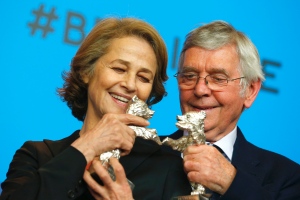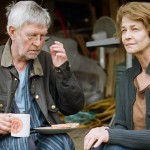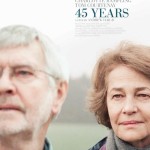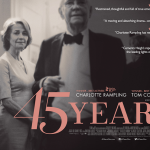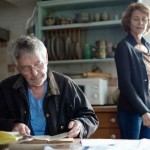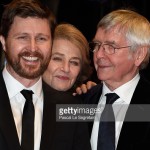You could write the plot of 45 Years on a postage stamp, though that is irrelevant. It is an exquisitely observed, beautifully acted drama about a relationship, a 45-year old marriage crumbling under the pressure of a change in circumstances. It is about communication and non-communication, topics that will always be current and pertinent to the human condition.
To illustrate the brevity of action, I quote the entire summary from Wikipedia:
Kate Mercer (Charlotte Rampling) and her husband Geoff (Tom Courtenay) had to cancel the party for their 40th anniversary at short notice when Geoff underwent bypass surgery. The comfortably off, left-wing, childless, provincial couple now have a week to go before a replacement party to celebrate their 45th anniversary. Theoretically, this week should just involve planning, dress purchasing and a bit of social fretting. This is not to be: shattering news arrives for Geoff from the Swiss authorities, explaining that the perfectly-preserved body of his ex-girlfriend, Katya, has been found, 50 years after she slipped into an Alpine crevasse. From the moment the news is received Kate can ‘smell Katya’s perfume in the room’ and her perspective on their marriage changes forever.
Together the Mercers are altogether familiar and contented. Kate is by far the better preserved of the two, takes a pride in her appearance and also in her marriage. Despite her hatred for parties, this is a party long overdue, a landmark for her. Geoff looks his age and is beginning the slow descent into dementia, witnessed by his mild aphasia – inability to remember words and therefore increasingly reliant on his dictionary – but remains apparently affectionate and committed. We see them making love, but them he turns away. It is not accidental.
Geoff’s long-term memory is unimpaired and remembrance of his time with Katya revives rapidly, much to Kate’s alarm, though he is selective in what he tells her. Worse, his behaviour changes: he swears more, he smokes, he stops shaving, he wakes in the night to find a photograph in the attic, he becomes more belligerent, he turns down long agreed social engagements, he becomes secretive, he goes places without her. Kate becomes increasingly concerned, then distracted, then jealous. Suddenly she can’t sleep. Overnight she looks 10 years older.
The simmering underlying tensions, minutely recorded, break out with a sudden and uncharacteristic raised voice, a furtive check of what really is in the attic. The deeper she looks, the more she finds things he had never revealed about his past relationship before they even met, the more she frets. When he starts behaving with consideration she worries even more. Even her piano playing captures her mood.
When Kate and Geoff are in conversation, the camera excludes Geoff and focuses pruriently on Kate’s stressed face, the worry ravaging her beauty. Andrew Haigh‘s sparse dialogue, much of it smalltalk, allows both actors time and space to develop character, to communicate inner feelings, which Haigh the director records with infinitesimal care.
When the party finally arrives, the smile is on their faces but Kate’s inner anxiety betrays her, culminating in Geoff’s rambling speech to their assembled friends, then to the irony of the first dance to Smoke Gets In Your Eyes by the Platters. And then… the haunting look on her face as the camera lingers. The closing title music? Go Now by the Moody Blues…
What I can tell you is that the choice of two distinguished actors in Charlotte Rampling and Tom Courtenay to play the leads was inspired casting. Courtenay, an actor I have long admired, demonstrates clearly the flip side of his performance in Quartet, while critics are unanimous in saying Rampling was never better. They are correct. Both won acting awards at the Berlin festival, and rightly so.
This is not a film that would appeal to mainstream tastes, all the more since it lacks any form of resolution or denouement, but then isn’t life like that? The depth and subtlety of emotional resonance puts a thousand other pictures in the shade. It is the intense, smouldering tragedy about a marriage that will never be the same again – art imitating real life.

